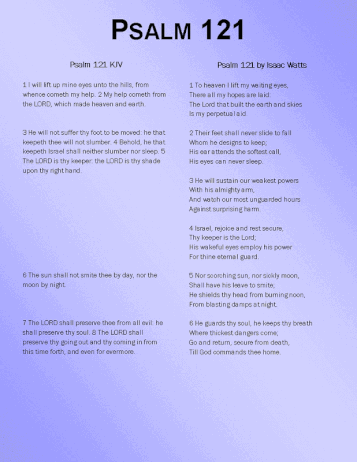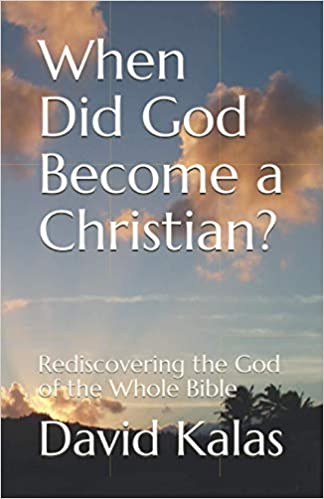Week Twenty-Seven Reading Assignment:
Psalms 121 - Psalms 143
"All scripture is inspired by God and is useful for teaching, for reproof, for correction, and for training in righteous-ness, so that everyone who belongs to God may be proficient, equipped for every good work."
(2Timothy 3:16-17 NRSV)
(2Timothy 3:16-17 NRSV)
This Week's Teaching Video: Learning to Pray from the Psalmist: Creative Name-Calling
Psalms to Hymns: by Isaac WattsPsalm 121 is among the most famous and cherished in the Psalter, and Isaac Watts' treatment of it is worth our attention this week.
The meter Watts chose for this Psalm is often referred to as "common meter." You will find that the poem can be sung to such familiar tunes as that of "O For a Thousand Tongues to Sing" or "Amazing Grace." Watts follows the Psalmist in an inter-esting use of personal pronouns. Both begin with the first person singular ("I will lift up mine eyes" and "To heaven I lift my waiting eyes". But while the need for help begins in the first person, the assur-ance soon shifts for the Psalmist to the second person ("He will not suffer thy foot to be moved") and for Watts to the third person ("Their feet shall never slide to fall"). Next Watts moves to a first-person plural testimony: "He will sustain our weakest powers..." And then he follows the Psalmist in making second-person reference to Israel. From that point on, the promises and assurances persist in the second-person in both the hymn and the original Psalm. The varied use of pronouns by both writers is part of the loveliness of each piece. It gives a kind of universally inclusive quality to the writing. Further-more, it allows for a fluid movement between genres of praise, testimony, and promise. Finally, the assortment of pronouns used to refer to the human beings in the Psalm stands in notable contrast to the pronoun used to refer to God. The "He" reference for God, you see, remains constant and unchanging, which makes the grammar match the message. In the end, the Psalm and the hymn are all about Him. And He, indeed, is constant and does not change. |
What to Watch for This MonthWatch for passages that, if you read them without knowing that they were from the Book of Psalms, you might think came from the New Testament. Many themes, emphases, and perspectives found in the Book of Psalms seem nearer to what we associate with the New Testament.
As you come to the end of the Book of Psalms, consider the various genres you encountered. What kinds of Psalm seem to be most common? Is that what you would have expected? What types of Psalms were most meaningful to you personally? How does the composition of the Book of Psalms compare to your own prayer life? What recurring themes do you observe in the Book of Proverbs? Generate a two-column list as you read Proverbs. In the one, list the things that characterize a wise person. In the other, list the things that characterize a fool. In Ecclesiastes, what are the author’s proofs that “all is vanity”? To what extent do you concur with his observations of the world? To what extent do you share his conclusions? We call the Song of Solomon a “love” song. In 1 Corinthians 13, Paul writes about “love.” John says that God is “love.” To what extent can one word apply to all three? As you read the prophet Isaiah, try to identify what were the most prevalent sins of God’s people at that time. At the end of a day’s reading, it might be helpful to ask, “If I didn’t know anything about God except for what I read today, what would I know about Him?” |

